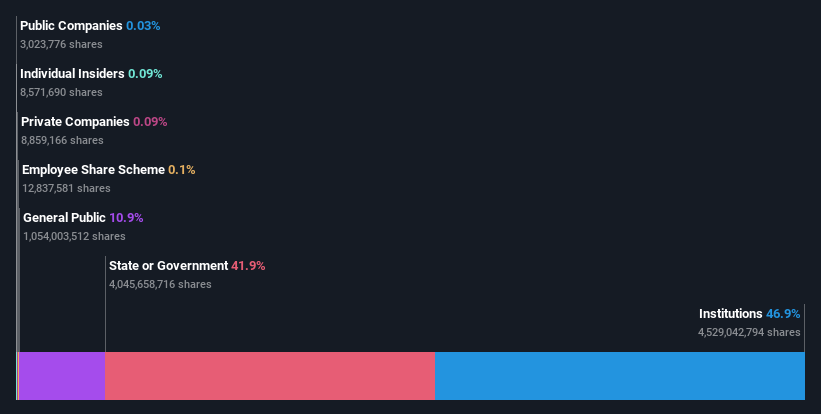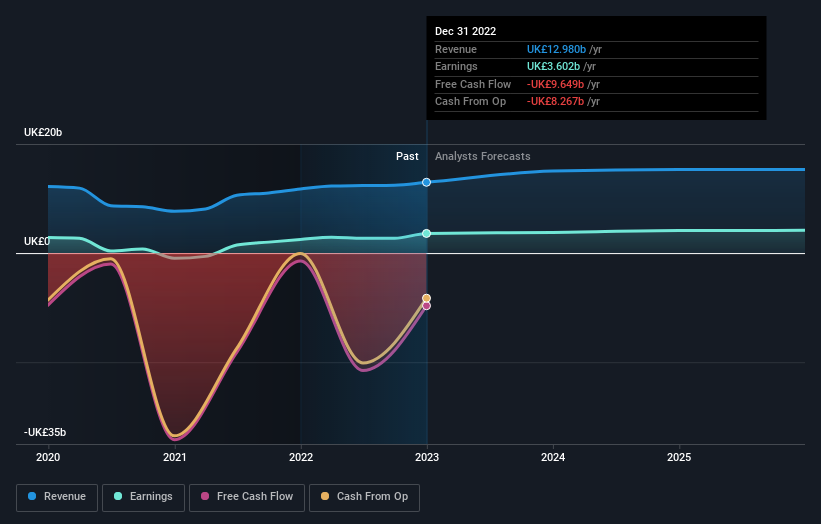- United Kingdom
- /
- Banks
- /
- LSE:NWG
NatWest Group plc's (LON:NWG) institutional investors lost 9.8% over the past week but have profited from longer-term gains

Key Insights
- Institutions' substantial holdings in NatWest Group implies that they have significant influence over the company's share price
- The top 4 shareholders own 52% of the company
- Analyst forecasts along with ownership data serve to give a strong idea about prospects for a business
To get a sense of who is truly in control of NatWest Group plc (LON:NWG), it is important to understand the ownership structure of the business. We can see that institutions own the lion's share in the company with 47% ownership. In other words, the group stands to gain the most (or lose the most) from their investment into the company.
Institutional investors was the group most impacted after the company's market cap fell to UK£25b last week. However, the 26% one-year returns may have helped alleviate their overall losses. We would assume however, that they would be on the lookout for weakness in the future.
Let's take a closer look to see what the different types of shareholders can tell us about NatWest Group.
Check out our latest analysis for NatWest Group

What Does The Institutional Ownership Tell Us About NatWest Group?
Institutions typically measure themselves against a benchmark when reporting to their own investors, so they often become more enthusiastic about a stock once it's included in a major index. We would expect most companies to have some institutions on the register, especially if they are growing.
NatWest Group already has institutions on the share registry. Indeed, they own a respectable stake in the company. This implies the analysts working for those institutions have looked at the stock and they like it. But just like anyone else, they could be wrong. When multiple institutions own a stock, there's always a risk that they are in a 'crowded trade'. When such a trade goes wrong, multiple parties may compete to sell stock fast. This risk is higher in a company without a history of growth. You can see NatWest Group's historic earnings and revenue below, but keep in mind there's always more to the story.

Hedge funds don't have many shares in NatWest Group. HM Treasury is currently the company's largest shareholder with 42% of shares outstanding. With 4.3% and 3.3% of the shares outstanding respectively, BlackRock, Inc. and Norges Bank Investment Management are the second and third largest shareholders.
Our research also brought to light the fact that roughly 52% of the company is controlled by the top 4 shareholders suggesting that these owners wield significant influence on the business.
Researching institutional ownership is a good way to gauge and filter a stock's expected performance. The same can be achieved by studying analyst sentiments. Quite a few analysts cover the stock, so you could look into forecast growth quite easily.
Insider Ownership Of NatWest Group
The definition of an insider can differ slightly between different countries, but members of the board of directors always count. Management ultimately answers to the board. However, it is not uncommon for managers to be executive board members, especially if they are a founder or the CEO.
I generally consider insider ownership to be a good thing. However, on some occasions it makes it more difficult for other shareholders to hold the board accountable for decisions.
Our information suggests that NatWest Group plc insiders own under 1% of the company. As it is a large company, we'd only expect insiders to own a small percentage of it. But it's worth noting that they own UK£22m worth of shares. It is good to see board members owning shares, but it might be worth checking if those insiders have been buying.
General Public Ownership
The general public, who are usually individual investors, hold a 11% stake in NatWest Group. While this size of ownership may not be enough to sway a policy decision in their favour, they can still make a collective impact on company policies.
Next Steps:
It's always worth thinking about the different groups who own shares in a company. But to understand NatWest Group better, we need to consider many other factors. Take risks for example - NatWest Group has 1 warning sign we think you should be aware of.
Ultimately the future is most important. You can access this free report on analyst forecasts for the company.
NB: Figures in this article are calculated using data from the last twelve months, which refer to the 12-month period ending on the last date of the month the financial statement is dated. This may not be consistent with full year annual report figures.
If you're looking to trade NatWest Group, open an account with the lowest-cost platform trusted by professionals, Interactive Brokers.
With clients in over 200 countries and territories, and access to 160 markets, IBKR lets you trade stocks, options, futures, forex, bonds and funds from a single integrated account.
Enjoy no hidden fees, no account minimums, and FX conversion rates as low as 0.03%, far better than what most brokers offer.
Sponsored ContentValuation is complex, but we're here to simplify it.
Discover if NatWest Group might be undervalued or overvalued with our detailed analysis, featuring fair value estimates, potential risks, dividends, insider trades, and its financial condition.
Access Free AnalysisHave feedback on this article? Concerned about the content? Get in touch with us directly. Alternatively, email editorial-team (at) simplywallst.com.
This article by Simply Wall St is general in nature. We provide commentary based on historical data and analyst forecasts only using an unbiased methodology and our articles are not intended to be financial advice. It does not constitute a recommendation to buy or sell any stock, and does not take account of your objectives, or your financial situation. We aim to bring you long-term focused analysis driven by fundamental data. Note that our analysis may not factor in the latest price-sensitive company announcements or qualitative material. Simply Wall St has no position in any stocks mentioned.
About LSE:NWG
NatWest Group
Provides banking and financial products and services to personal, commercial, corporate, and institutional customers in the United Kingdom and internationally.
Excellent balance sheet and good value.
Similar Companies
Market Insights
Community Narratives



